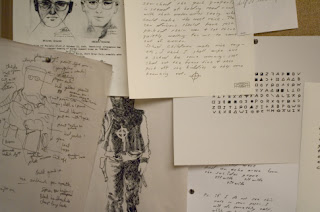
There’s part of me that thinks that given the increasingly high price of a cinema ticket, you need to get your money’s worth. But then I sit through a film like Zodiac ... a bum-numbing 158 minutes epic ... and remember that quality beats quantity every time.
Set in the San Francisco Bay Area, the film is based on a true story and real case notes. In opens in 1969, with the murder of a courting couple in a lonely car park. The murderer phones in the details to the police. Following on, there are a series of shootings and stabbings, with the serial killer identifying himself as Zodiac and keeping in touch with the authorities, even sending cryptic cipher sheets through to local newspapers.
The film alternates between the police investigation—hopelessly inefficient due to the lack of cooperation between the different county forces involved—and the city newspaper staff as they examine the evidence and try to identify the killer.
It’s a long, slow movie, that lacked the momentum to keep be interested all the way through. Although labelled as a thriller, it’s Vauxhall Conference material when compared to something like 28 Weeks Later or Sunshine.

Throughout the film, we see the serial killer’s obsession with murder matched with the all-consuming search that takes over the lives of the principle police investigator and the newspaper cartoonist. Their fixation with the unsolved case stretches throughout the 70s, 80s, and 90s.
We see the difficult in coordinating information between police departments, and the editorial ethics being teased out as the newspaper considers the demands of Zodiac to print his codes and letters, and the police wishes to suppress specific threats (like one against school buses) from the public at large.
As the film winds on towards its conclusion, original characters are cast off to the cutting-room floor: the journalist Avery recedes to his hazy house-boat, while the the cartoonist Graysmith spends more and more time leading the story. The lack of a firm resolution (the case is still unresolved in real life) cheats the cinema goer from a proper conclusion to their investment in a ticket.
Some trumpet the film as a triumph for its attention to police procedure, its exposure of prejudice and bending forensics (particularly handwriting analysis) to fit the suspects. Me? I think it’s about an hour too long, and about ten stunts short of being watchable. (BTW, the trailer for The Bourne Ultimatum looks good.) Why I didn’t fall asleep is a mystery!
Zodaic ... unless you’re into low energy police thrillers, avoid it like the plague. (And if you’re into plagues, and have a strong stomach, go and see 28 Weeks Later instead.)
2 comments:
I haven't seen it but I suspect a large part of the problem with this film is that it's being sold as a thriller. From what I understand, anyone going to see it expecting, well, thrills (or ten more stunts...) is going to be disappointed. That of course is the fault of the studio for marketing it that way, and not of the director for making the film in the way he did.
In fact I'd like to see it mainly because I think the director David Fincher is interesting and always produces stylish things out of his hat. Some commentators suggest that if approached from this angle, it might not be such a bad bet.
Yes. But I'm not sure that film is a good medium to try and tell a story that runs between 1969 and the 90s. I should be thankful that the film was only 2:40 long. The original test screening was a mammoth 3:08!
But isn't a paper book a more appropriate medium to tell such a story? Listening to Gareth and Jett discussing Zodiac on Film Talk I appreciate that the killings were presented in a non-entertaining, non-stuntlike way, portraying the raw inhumanity of murder. But I found the slowness of the film didn't reinforce its thoughtfulness ...
Post a Comment